Fleeing Ramadi residents face tough choices
- Published
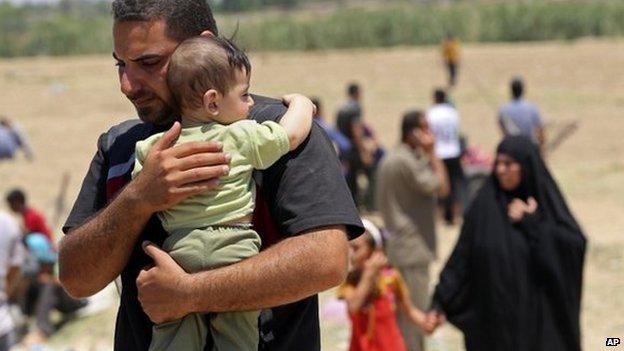
A displaced Ramadi man and child
As tens of thousands of civilians continue to flee Islamic State (IS) militants in the Iraqi city of Ramadi, BBC News talks to some of the people who escaped the fighting and still have family members caught up in the conflict.
Mohamed, 19, says he was taken by complete surprise by the sweeping takeover of the city by IS militants last week.
When he went to bed on Friday evening, everything seemed to be normal in the city. But by the time he woke up the next morning, he said, "the army had left its positions and IS were there in their place".
Mohamed is a local tribesman, but fortunately for him not a well-known figure because, he says, many "tribal leaders who couldn't escape were killed" soon after IS entered the city.
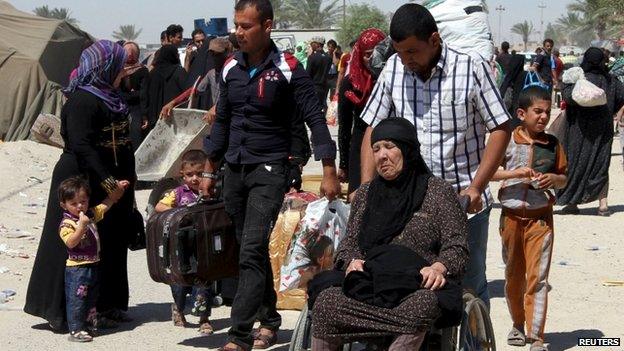
Many Ramadi residents made a quick decision to leave
Other residents have told media outlets that the IS militants were breaking into the homes of policemen and pro-government tribesmen.
It was only after the tribesmen were killed, Mohamed continues, that IS militants announced from a mosque in central Ramadi that they had captured the whole city.
"Now all of the tribes are dead, they've been killed, demolished. The only thing left are the Shia militias and I don't think they're going to do anything to help Ramadi."
Safety in numbers
Mohamed managed to evade the militants by hiding his weapons and clothes and travelling with the large numbers of families who fled.
He has cousins who remain in the city. He last heard from them on Sunday evening when they called to say they had been surrounded from all sides.

"They called just to say that they were going to die," he says. He hasn't heard from them since.
Like Mohamed, Ahmed also left some family members behind when he fled Ramadi with his wife and two children last weekend.
He says he has been in regular contact with his uncle, who was unable to leave the city because he simply had nowhere else to go.
"Whoever was against IS was killed by the militants and my uncle says there were bodies in the streets. IS has also raised flags on some of the buildings in the city," Ahmed says.
The militants allowed some people to flee the city, he explains, with families waving white flags to show they had surrendered.
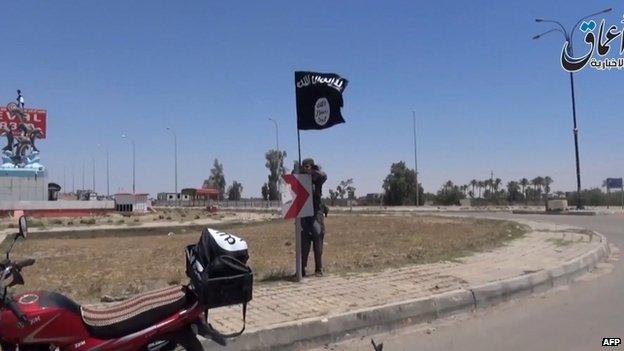
After the takeover of Ramadi, IS fighters hoisted the group's notorious black and white flag all over the city
The loss of Ramadi represented more the failure of the Iraqi armed forces than the success of IS, he argues, saying that the army showed a lack of faith and weakness.
"They just don't have the commitment to fight and they gave up."
'Like ants'
Ahmed described life under the militant group as an "unknown", saying he could not "live in an atmosphere filled with death, fear, horror and slaughtering".
"I would never feel safe living with people that are against life and humanity. They kill for the simplest reasons."
Ahmed has joined thousands of refugees in Khaldiyah, to the east of Ramadi.
Mohamed ended up in the same place, where he found 15 people packed into each room.
And when the battle started to turn eastwards, Mohamed decided to move on to Baghdad, where some of his uncles, who were injured in the IS attack, could receive medical treatment.
He says the IS militant advance was akin to ants that "come out from the ground".
"I think they just dig into the ground and come out from another area. We were surprised when we saw them all in Ramadi."
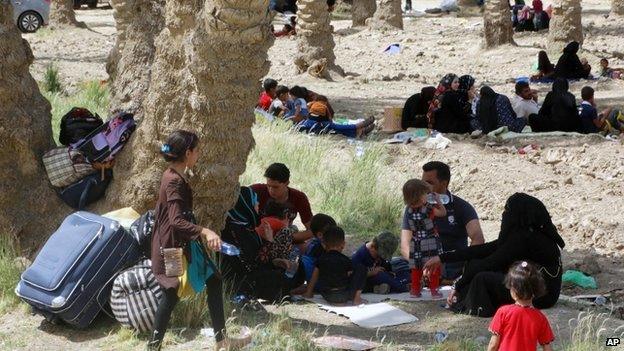
Aid agencies are struggling to cope with such huge numbers of refugees
Ammar is an Iraqi refugee currently in Turkey. His main concern rests with his family, who are currently stuck in the Habbaniyah area.
He told the BBC he was fearful for their safety, and has been urging them to consider where they could flee to.
Some 3,000 Shia militiamen have been deployed in a military camp in the area ahead of an attempt to recapture the city.
Despite this, life is normal in Habbaniyah right now, says Ammar, who is in regular contact with his sisters and father. "They don't have electricity, but that's just normal by Iraqi standards," he jokes.
However, his family are planning to leave because the fighting is getting too close for comfort. "They are worried to death and they don't know what to do - they don't have many choices left."
'Cat and mouse'
Ammar had first-hand experience of dealing with an IS onslaught when his house was on the frontline of the IS advance into Fallujah at the end of 2013.
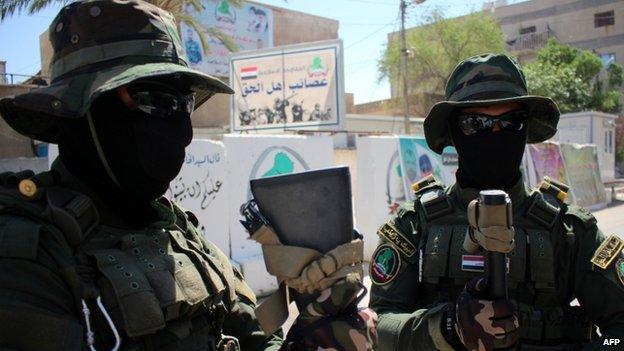
Shia militiamen have been summoned to help fight the battle against IS to recapture Ramadi
"I left the first hour of the first day Islamic State militants entered the city," he recalls. He has since heard from his former Baghdad neighbours that his home was largely destroyed in bombing by Iraqi government forces trying to recapture the city.
He moved from Fallujah first to Habbaniyah, then onto Baghdad and finally Turkey. In all that time, he says he has not once seen an IS fighter. "It feels like we're still running from them."
He says the battle against IS is "not taken seriously - it's like a game of cat and mouse".
But, he continues, "I hope and think every game has an end - I just don't know when this will be."
All names have been changed to protect the identity of the interviewees
Interviews conducted by Sarah Fowler and Marwa Al-Nagar